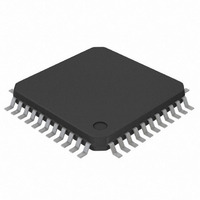DSPIC30F4013-20E/PT Microchip Technology, DSPIC30F4013-20E/PT Datasheet - Page 5

DSPIC30F4013-20E/PT
Manufacturer Part Number
DSPIC30F4013-20E/PT
Description
IC DSPIC MCU/DSP 48K 44TQFP
Manufacturer
Microchip Technology
Series
dsPIC™ 30Fr
Datasheets
1.DSPIC30F2011-20ISO.pdf
(66 pages)
2.DSPIC30F3014-30IPT.pdf
(228 pages)
3.DSPIC30F3014-30IPT.pdf
(16 pages)
4.DSPIC30F3014-30IPT.pdf
(6 pages)
5.DSPIC30F3014-30IPT.pdf
(14 pages)
6.DSPIC30F3014-30IPT.pdf
(20 pages)
7.DSPIC30F4013-20EPT.pdf
(220 pages)
8.DSPIC30F3014-20IP.pdf
(226 pages)
Specifications of DSPIC30F4013-20E/PT
Program Memory Type
FLASH
Program Memory Size
48KB (16K x 24)
Package / Case
44-TQFP, 44-VQFP
Core Processor
dsPIC
Core Size
16-Bit
Speed
20 MIPS
Connectivity
CAN, I²C, SPI, UART/USART
Peripherals
AC'97, Brown-out Detect/Reset, I²S, POR, PWM, WDT
Number Of I /o
30
Eeprom Size
1K x 8
Ram Size
2K x 8
Voltage - Supply (vcc/vdd)
2.5 V ~ 5.5 V
Data Converters
A/D 13x12b
Oscillator Type
Internal
Operating Temperature
-40°C ~ 125°C
Product
DSCs
Data Bus Width
16 bit
Processor Series
DSPIC30F
Core
dsPIC
Maximum Clock Frequency
20 MHz
Number Of Programmable I/os
30
Data Ram Size
2 KB
Maximum Operating Temperature
+ 125 C
Mounting Style
SMD/SMT
3rd Party Development Tools
52713-733, 52714-737, 53276-922, EWDSPIC
Development Tools By Supplier
PG164130, DV164035, DV244005, DV164005, PG164120, ICE4000, DM240002, DM300018, DM330011
Minimum Operating Temperature
- 40 C
Package
44TQFP
Device Core
dsPIC
Family Name
dsPIC30
Maximum Speed
20 MHz
Operating Supply Voltage
3.3|5 V
Interface Type
CAN/I2C/SPI/UART
On-chip Adc
13-chx12-bit
Number Of Timers
5
Core Frequency
20MHz
Embedded Interface Type
CAN, I2C, SPI, UART
No. Of I/o's
30
Flash Memory Size
48KB
Supply Voltage Range
2.5V To 5.5V
Rohs Compliant
Yes
Lead Free Status / RoHS Status
Lead free / RoHS Compliant
For Use With
AC30F006 - MODULE SKT FOR DSPIC30F 44TQFP
Lead Free Status / Rohs Status
Lead free / RoHS Compliant
Other names
DSPIC30F401320EPT
Available stocks
Company
Part Number
Manufacturer
Quantity
Price
Company:
Part Number:
DSPIC30F4013-20E/PT
Manufacturer:
Microchip Technology
Quantity:
10 000
4. Module: Interrupt Controller – Sequential
© 2008 Microchip Technology Inc.
When interrupt nesting is enabled (or NSTDIS
(INTCON1<15>) bit is ‘0’) the following sequence
of events will lead to an address error trap. The
generic terms “Interrupt 1” and “Interrupt 2” are
used to represent any two enabled dsPIC30F
interrupts.
1. Interrupt 1 processing begins.
2. Interrupt 1 is negated by user software by one
3. Interrupt 2 occurs with a priority higher than
EXAMPLE 4: USING DISI
EXAMPLE 5: RAISING CPU INTERRUPT PRIORITY LEVEL
EXAMPLE 6: USING MACRO
.include
...
DISI#2 ; protect the disable of INT1
BCLRIEC1, #INT1IE; disable interrupt 1
...
.include
...
__asm__ volatile (“DISI #0x1FFF”);
SRbits.IPL = 0x5;
DISICNT = 0x0;
#define DISI_PROTECT(X) {\
DISI_PROTECT(SRbits.IPL = 0x5);
of the following methods:
- CPU IPL is raised to Interrupt 1 IPL level or
- Interrupt 1 IPL is lowered to CPU IPL level or
- Interrupt 1 is disabled (Interrupt 1 IE bit set to
- Interrupt 1 flag is cleared
Interrupt 1.
higher or
lower or
‘0’) or
__asm__ volatile (“DISI #0x1FFF”);\
X;
DISICNT = 0; }
; next instruction protected by DISI
Interrupts
“p30fxxxx.inc”
“p30fxxxx.h”
\
// safely modify the CPU IPL
// protect CPU IPL modification
// set CPU IPL to 5
// remove DISI protection
dsPIC30F3014/4013
Work around
The user may disable interrupt nesting or execute
a DISI instruction before modifying the CPU IPL
or Interrupt 1 setting. A minimum DISI value of 2
is required if the DISI is executed immediately
before the CPU IPL or Interrupt 1 is modified, as
shown in Example 4. If the MPLAB C30 compiler
is being used, one must inspect the Disassembly
Listing in the MPLAB IDE file to determine the
exact number of cycles to disable level 1-6
interrupts. One may use a large DISI value and
then set the DISICNT register to zero, as shown in
Example 5. A macro may also be used to perform
this task, as shown in Example 6.
DS80228K-page 5























